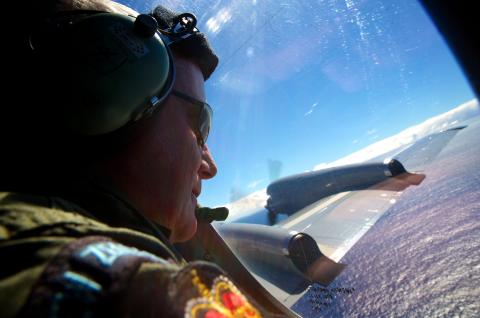Advertisement
Lost Malaysian Jetliner To Dominate Industry Meet As Tracking Row Goes On
DOHA/KUALA LUMPUR (Reuters) - Global airlines are gathering in Doha for an industry summit intended to celebrate 100 years of commercial air travel, but now darkened by the disappearance of Malaysian jetliner MH370.
The International Air Transport Association, which represents about 80 percent of the aviation industry, has pledged to find new ways to track aircraft as the international search for MH370, now three months old, hits fresh obstacles.
"The loss of MH370 continues to be on everybody's mind," Tony Tyler, director general of IATA, said ahead of the meeting.
Equally on airlines executives' minds however is the cost of fitting aircraft with the equipment needed to track them by satellite - a keen worry particularly for smaller players.
The industry, where onerous approval procedures slow the adoption of new technologies, has been criticized for not moving faster to implement regular tracking standards after the crash of Air France flight 447 in 2009.
"The bigger airlines that fly globally might have the cash for it, but the smaller players already have their margins stressed and don't have much money left to spare," an Asian airline executive said, asking not to be identified.
Tracking will certainly be the dominant issue at the June 1-3 annual meeting in Qatar's capital of IATA, which groups 240 airlines.
But airport regulation, changes to cargo laws and growing concerns over the problem of dealing with unruly passengers will also be on the agenda.
RARE CO-OPERATION
Earlier this month IATA pledged to set up a task force to find ways of tracking aircraft in the short term while the United Nations' aviation agency develops long-term standards.
Two UN agencies have held rare international meetings of governments and industry on the issue in the past month, first at the Montreal base of the International Civil Aviation Organization (ICAO) and most recently in Kuala Lumpur, where Flight MH370 departed on March 8 before vanishing without trace.
Previous regulatory studies on the issue have identified costs as an issue, particularly the recurring satellite fees. But a senior ICAO official expressed optimism after the international gathering that airlines would go ahead soon with real-time tracking without cost getting in the way.
Airline pilot and blogger Patrick Smith told Reuters: "We're hearing more chatter about certain ideas than we did in the past."
One idea worth considering, he said, would be an independently-powered transmitter that relays where the aircraft is even if electric power is lost completely. A system of continuous data streaming from onboard systems, as some others have suggested, would be unnecessary as well as expensive.
With no clear agreement on the technology to use there is still no clear time scale for when it might be implemented.
On the eve of the IATA talks, some officials pointed out it would take a rare degree of co-operation between the big and small players of a cut-throat industry to make the system work.
"If the vendors don't have the ecosystem of buyers to sell to, it will end up being a small and expensive product that only a few airlines can take on," said an Asian regulator attending this week's Kuala Lumpur tracking talks.
CARGO DOLDRUMS
IATA will also discuss the shape of the $750 billion global airline industry as a cyclical recovery rubs up against concerns over emerging market economies and China's slowdown.
While passenger numbers are rising, the air freight business has been in the doldrums for some time: Cargo volumes rose by 3.2 percent in April, compared with a 7.5 percent rise in passenger traffic. IATA delegates will discuss ways of shortening shipping times to improve the competitiveness of their cargo businesses.
"Partnerships could a be a way for airlines to combat the weak cargo market," said Metzler analyst Juergen Pieper.
IATA will provide updated forecasts for the industry's profitability on Monday during the meeting. Its current forecast is for 2014 industry profit of $18.7 billion on $745 billion in global revenue, equivalent to a profit margin of 2.5 percent, or about $5.65 per passenger carried.
GULF ROW
Qatar's capital Doha, which inaugurated its new $15 billion airport in April, will be the first city in the Gulf to host the IATA meeting.
But the growing significance of its airlines and those of other Gulf states is also fuelling a row with European and U.S. carriers who may raise their concerns at the meeting.
Through modern infrastructure and support from state governments, Gulf airlines have drawn more travelers from former hubs in Europe and Asia to the Middle East and helped the Gulf to globalize its economy and diversify oil-based revenue.
In just over a decade, the share of global traffic accounted for by Middle East airlines has increased to 9 percent from 4 percent, Tyler said.
European and U.S. carriers claim the state-owned status of airlines like Emirates[EMIRA.UL], Abu Dhabi's Etihad Airways and Qatar Airways, and possible fuel subsidies, mean they are not competing on a level playing field.
The Gulf carriers have denied receiving any subsidies from their respective governments, though the issue was brought to the fore earlier this month after reports that fast-growing Etihad Airways had access to an interest-free $3 billion loan from Abu Dhabi's ruling family.
(With additional reporting by Praveen Menon and Tim Hepher; Editing by Sophie Walker)



















Add new comment